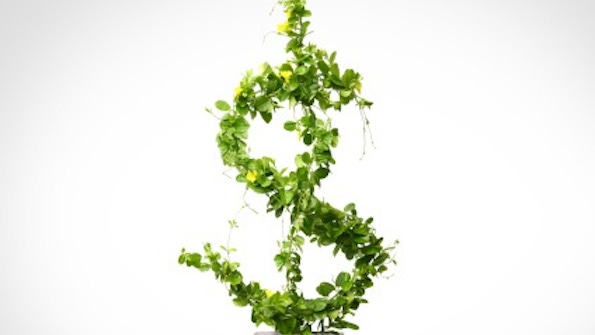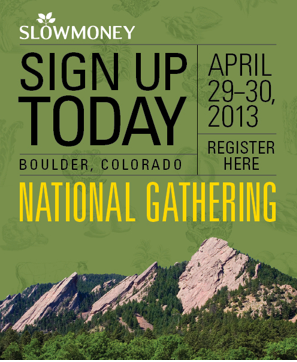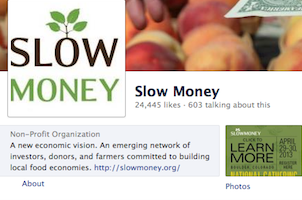From New Hope Natural Media Partner Slow Money. Slow Money is bringing business financing down to earth—literally. Newhope360 looks at this new form of social investing that connects small food entrepreneurs with farmers, processors, manufacturers and restaurants. Join the movement at Slow Money's National Gathering in Boulder, Colorado on April 29 and 30.

What comes to mind when you think of investing? Do you conjure images of packed Wall Street-trading rooms or ambiguous mutual funds? Modern day investment is often disembodied from quotidian lives, focused on industries that investors may not have a concrete connection to. This is why despite a string of strangely high stock market scores (the Dow Jones Industrial Average recently spiked to record-breaking levels), the United States economy still struggles; high unemployment rates, rampant debt and sluggish housing markets still plague most communities.
Although the financial market may look good on paper, in reality there is disconnect between wealth in the stock market and wealth in real life. Dow levels aren’t indicative of economic health because investment monies are channeled into fiscally tempting but into abstract industries, like technology or foreign consumerism. Local communities miss out on this wealth.
“This is a small reflection of a much larger challenge,” said Woody Tasch, founder of the national nonprofit Slow Money, which is focused on a new kind of investment model. “Over the last 50 years, all of this financial wealth has been created, but it’s not translating into the benefits of workers, communities, the environment and everyday people.”
Slow Money aims to bridge this gap by literally bringing investment back down to earth. By connecting networks of investors with small food entrepreneurs, such as farmers, processors, manufacturers and restaurants, Slow Money’s goal is to rebuild local food systems. Pumping capital into decentralized business ventures provides a backup for when the massive, national financial systems like Wall Street fail, as they have before and inevitably will again.
“If you think generationally about the world we want to leave, then you’ve got to do something different with your money,” continues Tasch. “Otherwise, you just let your money circulate through this consumption machine where there’s no such thing as too fast or too big or too abstract.
“I can’t think of anything better to do than invest in a small food business near where you live. It’s immediate and positive.” Slow Money has 17 chapters across the country, and has helped investors donate $22 million into small food enterprises.
Slow Money and the Soil Trust
Slow Money is certainly connected to the grassroots Slow Food movement, which focuses on creating a stronger connection between consumer and farmer, and it also has strong Gandhian roots as well. Yes, that Gandhi.
In addition to teaching non-violence and peaceful protests, Gandhi also practiced other concepts that apply to Slow Money’s principles. “One of them is based on each village or each locality being self-sufficient to the maximum extent possible,” said Arvind Ashta, chair of microfinance at the Burgundy School of Business and speaker at the upcoming Slow Money National Gathering in Boulder, Colorado on April 29 and 30.“I think we can add the notion of slow money, as opposed to fast food and fast money, which we no longer understand and which may no longer be adding value except for the very manipulative few,” continued Ashta.
To bring these Gandhian concepts to fruition, Slow Money spearheads an initiative called the Soil Trust. Launched in October 2012, the Soil Trust aggregates donated funds to small-to-mid-size food operations. As a byproduct of these investments, the Soil Trust ultimately benefits, well, the soil. Fostering food entities that respect the ground contributes to more fertile environs—and therefore more overall output.
“Growing good food involves the symbiotic interaction of billions of microorganisms in topsoil that took millennia to recreate,” said Tasch. With its proliferation of pesticides, herbicides, and macro-fertilizers like nitrogen or phosphorus, industrial agriculture destroys these vital relationships.
The Soil Trust differs from other forms of microfinance because it gathers tax-deductible funds from people who want to bolster the local-food future. Small donations—$25, $50, $100, and even thousands of dollars are given to the Trust, which awards these extremely low-interests loans to small food enterprises. The Soil Trust absorbs investment returns, allowing it to reinvest into other food projects. It’s an enduring, closed loop.
“To protect the environment, we need a slow money movement, which talks about environment and social factors and local needs,” explains Ashta. “We also then need someone to coordinate the efforts of many enlightened but myopic social entrepreneurs since their vision is going to be locally.” The Soil Trust manages these philanthropic funds. “This is a way for lots of people with a little money to contribute and feel like they are investing in the future of food,” continues Tasch.
Join the movement at Slow Money's National Gathering
On April 29 and 30, sustainable food entrepreneurs from across America—many who are candidates for Soil Trust loans—will congregate in Boulder, Colorado for the 4th Slow Money National Gathering. They will hear from thought leaders, including Slow Food founder Carlo Petrini, sustainable activist Winona LaDuke, and Mary Berry, executive director of the Berry Center, to celebrate and learn how Slow Money can transform our fractured food system.
Slow Money takes financial investment ideologies and applies them for the greater good: A smart, practical way of thinking about Slow Food. Indeed, this nonprofit was the missing piece to the sustainable food puzzle.
Connect with Slow Money on Facebook and Twitter.
Register for Slow Money's National Gathering.
About the Author(s)
You May Also Like








